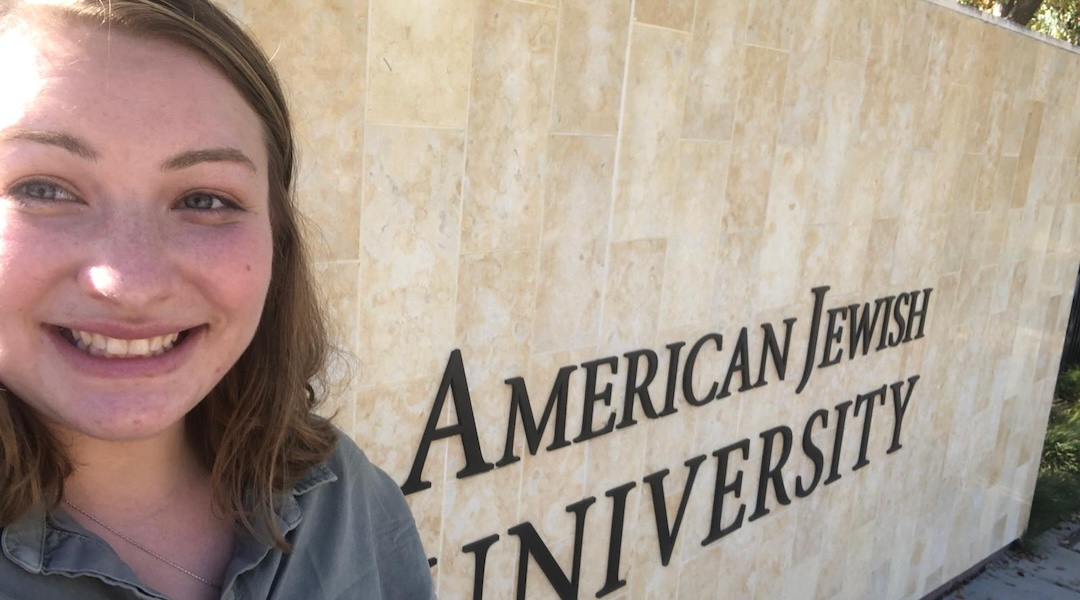Investigation clears Ziegler rabbinical school deans of ethics code allegations
But an ethics committee found that two rabbis “did not always meet the highest standards of conduct expected” of them

Shayna Dollinger, photographed on campus before the relocation of American Jewish University and its Ziegler rabbinical school. (Courtesy)
(JTA) — An investigation into misconduct complaints against the two administrators of the Ziegler School of Rabbinic Studies in Los Angeles found no ethical violation warranting public action against them.
The investigation arose from allegations by former students at the rabbinical school that Rabbi Bradley Shavit Artson, the school’s dean, and his deputy, Rabbi Cheryl Peretz, fostered a toxic culture and showed favoritism toward male students.
The ethics committee of the Rabbinical Assembly, a membership association for Conservative rabbis, held a meeting Thursday to notify at least one of the complainants, Shayna Dollinger, of the investigation’s resolution.
Following more than a year of collecting information and deliberation, the committee, known as Va’ad HaKavod, largely cleared Artson and Peretz of wrongdoing. It said in a letter to Dollinger that it did not find an ethics code violation that merited suspension or expulsion from the Rabbinical Assembly.
The committee concluded, however, that “certain interpersonal behaviors of the rabbi administrators did not always meet the highest standards of conduct expected” of them, according to the letter, which Dollinger shared with the Jewish Telegraphic Agency.
The rabbis and the leadership of American Jewish University, which houses the rabbinical school, declined to comment for this story.
Due to its findings, the committee devised an undisclosed action plan for the two rabbis, which they have accepted, according to the letter, which notes that it is against the committee’s policy to share any additional information when there’s not been a more serious violation.
“Both rabbi administrators have acknowledged the hurt experienced by some former students, have accepted the action plans, and have embraced the opportunity to improve and grow,” the letter states.
The conclusion of the committee is in line with the findings of a related investigation undertaken by a law firm on the behest of American Jewish University and completed earlier this year. An email at the time to the campus community announcing the investigation’s conclusion said the law firm did not find systemic problems. Artson and Peretz were not named in the email. Several of the students who had complained demanded, unsuccessfully, that the university release a report detailing the law firm’s work.
Dollinger, who left Ziegler in 2022 amid what she says was the administration’s inadequate action against sexual harassment she faced from a fellow student, responded to the ethics committee’s news with disappointment. She said she was especially dismayed because it came days ahead of Judaism’s High Holidays, which involves a period of teshuvah, or communal repentance.
“At AJU, I experienced silence from those in charge when I should have been supported,” Dollinger said. “AJU silenced the legal report, compounding the harm. Now, the ethics committee hides behind its own policy to shield those who cause harm from accountability. None of this is teshuvah. It is the very opposite of our tradition.”
Dollinger’s reaction was echoed by another former student, Rabbi Danya Ruttenberg, who also alleged mistreatment during her time at Ziegler. Ruttenberg announced in July that she had disaffiliated from the Conservative movement.
“We have been saying this whole time that what we want is transparency, accountability, and the prevention of future harm — and this outcome guarantees none of these things,” Ruttenberg told JTA.
The allegations against Artson had been a source of friction in Germany, where he was recently tapped to lead the creation of a new rabbinical school there. “Even the appearance of an abuse of power, as is clearly evident in the allegations against Rabbi Artson, is unacceptable,” a local critic of the new school told JTA earlier this month. Artson said at the time that the Rabbinical Assembly’s investigation was “wrapping up” and that he was “focusing on building the future.”
As an arm of the Rabbinical Assembly, the ethics committee can discipline members but holds no power over the hiring decisions of any institution or synagogue.
Suspensions and expulsions are rare for the 1,700-member assembly, with only 10 permanent expulsions since 2007. The most recent one happened in May with the expulsion of Jonathan Case, the former spiritual leader of Congregation Beth Shalom in Columbia, South Carolina, over “boundary violations and sexual misconduct and a failure to comply with the Va’ad HaKavod terms of provisional suspension,” according to an official notice of the expulsion.
After receiving the black mark, Case found part-time employment as a rabbi for a small, non-denominational congregation serving American Jewish retirees in Mexico’s Lake Chapala area.
















